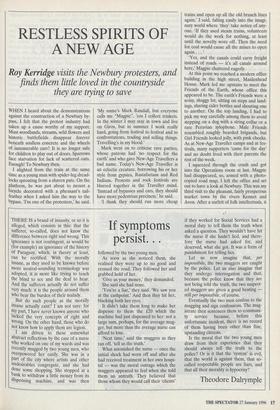If symptoms
persist.. .
THERE IS a brand of insanity, or so it is alleged, which consists in this: that the sufferer, so-called, does not know the difference between right and wrong. This ignorance is not contingent, as would be (for example) an ignorance of the history of Paraguay, which, in theory at least, Can be rectified. With the morally insane, as they used to be known before more neutral-sounding terminology was adopted, it is more like trying to teach the blind to see and the deaf to hear. And the sufferers actually do not suffer Very much: it is the people around them who bear the burden of their malady.
But do such people as the morally insane actually exist? I am not sure: for my part, I have never known anyone who lacked the very concepts of right and wrong. On the other hand, those who do not know how to apply them are legion. I am driven to these somewhat abstract reflections by the case of a nurse who worked on one of my wards and was recently mugged by two young men, who overpowered her easily. She was in a part of the city where artists and other undesirables congregate, and she had done some shopping. She stopped at a bank to withdraw a little money from its dispensing machine, and was then followed by the two young men.
As soon as she noticed them, she realised they were up to no good and crossed the road. They followed her and grabbed hold of her.
`Give us your money,' they demanded. She said she had none.
`You're a liar,' they said. 'We saw you at the cashpoint.' And then they hit her, blacking both her eyes.
It didn't take them long to make her dispense to them the £20 which the machine had just dispensed to her: not a large sum, perhaps, for the average mug- ger, but more than the average nurse can afford to lose.
`Next time,' said the muggers as they ran off, 'tell us the truth.'
What astonished the nurse — once the initial shock had worn off and after she had received treatment in her own hospi- tal — was the moral outrage which the muggers appeared to feel when she told them an untruth. They believed that those whom they would call their 'clients' if they worked for Social Services had a moral duty to tell them the truth when asked a question. They wouldn't have hit the nurse if she hadn't lied, and there- fore the nurse had asked for, and deserved, what she got. It was a form of punishment for telling lies.
Let us now imagine that, per impossibile, the two muggers are caught by the police. Let us also imagine that they undergo interrogation and that, because the police know that they are not being told the truth, the two suspect- ed muggers are given a good beating still per impossibile, of course.
Eventually the two men confess to the mugging and sign confessions. The mag- istrate then sentences them to communi- ty service because, before this unfortunate incident, there is no record of them having been other than fine, upstanding citizens.
Is the moral that the two young men draw from their experience that they should always tell the truth to the police? Or is it that the 'system' is evil, that the world is against them, that so- called respectable people are liars, and that all their morality is hypocrisy?
Theodore Dalrymple


























































 Previous page
Previous page